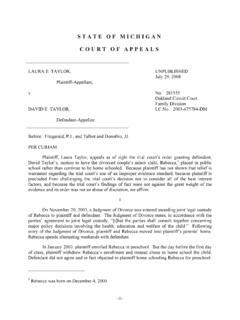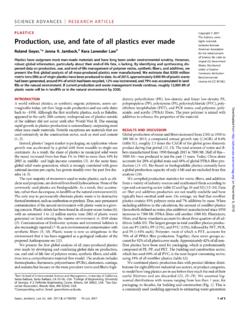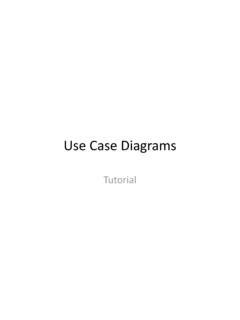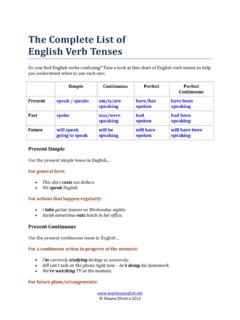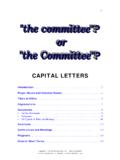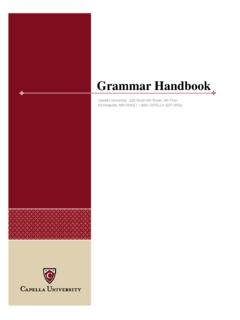Transcription of Any and All: To Use Or Not To Use? - State Bar of Michigan
1 Plain Language" any and all ": to use or not To Use?By David S. ElderI was given a rough time recently bytwo friends about what they describedas "the pompous verbiage that lawyersuse for language." One of them said, "Isuppose you lawyers refer to Dana'sclassic as Two Years Prior to theMast." The other added, 'And you prob-ably call that popular poem of Kipling's'In the Event That."' Was there any an-swer I could make?-Williard, 49 ABA J 934 (1963)erhaps this simple anecdote saysit all. But does it really?Lawyers, for as many years asthere have been lawyers, have debatedthe use of plain language in their speechand written work. Is the use of "le-galese" and redundant phrases a self-protecting language that lawyers useto insulate themselves from the restof society?
2 Do lawyers use phrasessuch as "hereby" and "party of thefirst part" simply because these termshave become reflexive Pavlovian legallanguage?And most important, when may finedistinctions in meaning influence theoutcome of a case? Certainly one ofthe greatest fears that a lawyer facesis the possibility of an adverse judg-ment because of misusing a word orphrase."Plain Language' is a regular feature of theMichigan Bar Journal, edited by JosephKimble for the State Bar Plain English Com-mittee. Assistant editor is George H. this column the Committee hopes topromote the use of plain English in the to contribute a plain English article?Contact Prof. Kimble at Thomas Cooley LawSchool, Box 13038, Lansing, MI what about " any and all "?
3 Is itreally necessary, or can it be discardedas archaic and redundant? Death bypurposeful neglect or continued exis-tence by legal need, that is the 's Ninth New Collegiate Dic-tionary (Merriam-Webster, 1984), p 93,gives the following as one definitionof the word "any": "2: one, some, or allindiscriminately of whatever quantity:a: one or more-used to indicate anundetermined number or amount."And the reverse is also true. Onedefinition of "all" is "any whatever." Id.,p 71. In other words, "any" is broadenough to include "all," and "all" canmean any more convincing is Black's LawDictionary (6th ed), p 94, which de-fines "any" as follows:"Some, one out of many; an indefinitenumber.
4 One indiscriminately of what-ever kind of quantity .. '[Alny' has adiversity of meaning and may be em-ployed to indicate 'all' or 'every' as wellas 'some' or 'one' and its meaning in agiven statute depends upon the contextand the subject matter of the is often synonymous with 'either,''every,' or 'all."' (Citations omitted;emphasis added.)Authorities on legal writing haveurged writers to avoid using "any andall." Bryan Garner's Elements of LegalStyle (Oxford University Press, 1991),pp 187-188, convincingly recommends:" Instead of Using Doublets orTriplets, Use a Single the lawyer's least endearinghabits is to string out causes are several. First, the lan-guage of the law has its origins in theunhurried prose of centuries past.]
5 Sec-ond, the strong oral tradition in Eng-land led inevitably to a surfeit of wordsto allow time for the listener to take inthe speaker's point. Third, where oneof the words might be unfamiliar, thesynonym served as a gloss. Finally,lawyers distrusted their ability to findthe right word, and therefore used averbal scattergun instead of a rifle a result, we still use phrases suchas these:agree and covenantall and singularany and allReed Dickerson, in his Fundamentalsof Legal Drafting (2d ed, Little, Brown,1986), p 208, agrees that the draftershould avoid " any and all " and similarpairs one of which includes the drafter "should use the broader ornarrower term as the substance re-quires.
6 " other commentators have calledfor the abandonment of " any and all ."In Squires and Mucklestone, A Simple"Simple" Will, 57 Wash L R 461 (1982),the authors set forth a guide for willsthat is simple in form yet sophisticatedin substance. "The authors attemptedto avoid both unneeded precision andvagueness and instead attempted tomake statements general wheneverpossible." Id., p 463. This article in-cludes a list of recurring phrases thatcan be consistently shortened or sim-plified. And the list includes a phrasethat we have come to know quite Phrasesand Wordsin respect to, ofany and allall or any partin the event thataforesaidRevised Totoallanyif[omit or specify] Michigan BAR JOURNALOCTOBER 1991 Michigan BAR JOURNALOCTOBER 1991 PLAIN LANGUAGEU nrevised Phrasesand Words Revised Toto make any suchdistributions to distributeprovided that ifproperty of every kindand character any propertysaid, such, same [omit]
7 Expiration endDespite all of this advice, "any andall" finds its way into lawyers' speech,memorandums, briefs, and opinions,and most often into insurance andindemnification Michigan Supreme Court seemedto approve our dictionary definitionsof "any" in Harrington v Interstate Busi-ness Men's Accident Ass'n, 210 Mich 327,330; 178 NW 19 (1920), when it quotedHopkins v Sanders, 172 Mich 227; 137NW 709 (1912). The Court defined"any" like this:"In broad language, it covers 'arl'v finaldecree' in 'any suit at law or in chan-cery' in 'any circuit court.' Any' means,every,' 'each one of all."'In a later case, the Michigan Su-preme Court again held that the use of"any" in an agency contract meant "all.
8 "In Gibson v Agricultural Life Ins Co, 282 Mich 282, 284; 276 NW 450 (1937),the clause in controversy read:"14. The Company shall have, and ishereby given a first lien upon any com-missions or renewals as security forany claim due or to become due tothe Company from said Agent." (Em-phasis added.)The Gibson court was not persuadedby the plaintiff's insistence that theword "any" meant less than "all":"Giving the wording of paragraph 14 oJthe agency contract its plain and un-equivocable meaning, upon arriving atthe conclusion that the sensible conno-tation of the word any' implies 'all' andnot 'some,' the legal conclusion followsthat the defendant is entitled to retainthe earned renewal commissions aris-ing from its agency contract with Gib-son and cannot be held legally liable forsame in this action," Gibson at 287(quoting the trial court opinion).
9 The Michigan Court of Appeals hassimilarly interpreted the word "any" asused in a Michigan statute. In McGrathv Clark, 89 Mich App 194; 280 NW2d480 (1979), the plaintiff accepted de-fendant's offer of judgment. The offersaid nothing about prejudgment inter-est. The statute the Court examinedwas MCL ; MSA :"Interest shall be allowed on any moneyjudgment recovered in a civil "The Court held that "the word 'any' isto be considered all-inclusive," so thedefendants were entitled to at your Lexus consultant RFqrHD 'UD,= 1-800-552-2339to arrange for a personal evaluation us for a test drive & judge for yourself,OCTOBER 1991 Michigan BAR JOURNALPLAIN LANGUAGER ecently, the Court has again heldthat "[alny means 'every,' 'each one ofall,' and is unlimited in its scope.]
10 "Parker v Nationwide Mutual Ins Co, 188 Mich App 354, 356; 470 NW2d 416(1991) (quoting Harrington v Inter- State Men's Accident Ass'n, supra).On the other hand, at least one panelhas held that "any" as used in an in-demnification contract was wanting forvagueness. In Geurink v Herlihy Mid-Continent Co, 5 Mich App 154, 156-157; 146 NW2d 111 (1967), an indem-nification contract contained the fol-lowing language:"The subcontractor hereby waives andreleases the general contractor fromall liability for injuries to persons anddamages to and loss of property whichthe subcontractor may suffer or sustainin performance of this subcontract, orin connection herewith.

